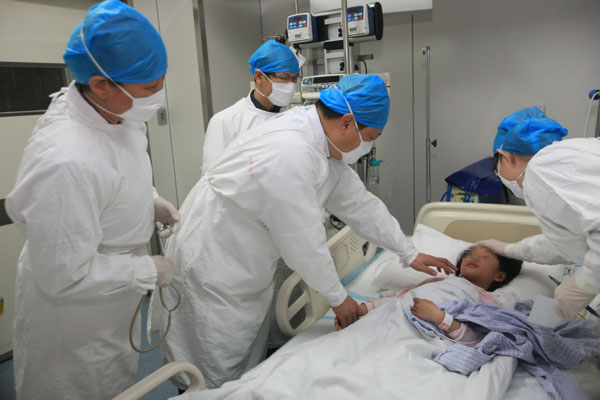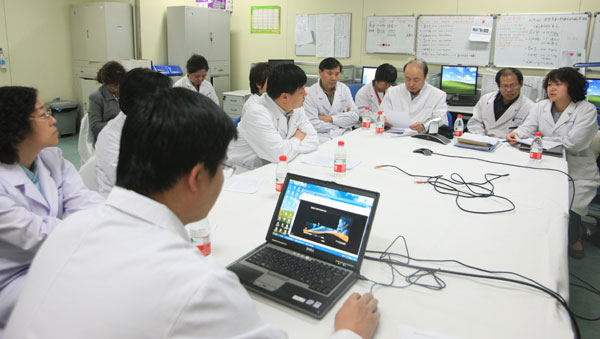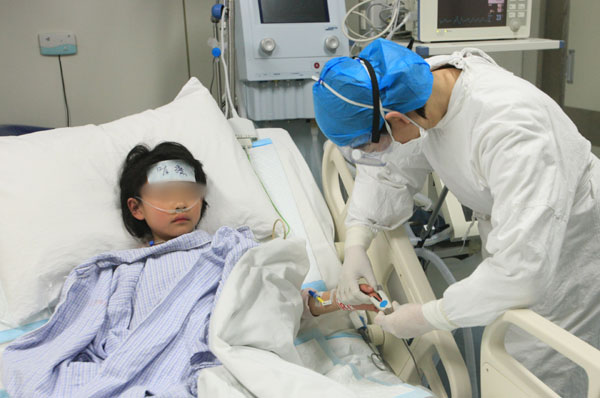Beijing confirms first H7N9 infection
Updated: 2013-04-14 08:19
By Wang Qingyun in Beijing and Wang Hongyi in Shanghai (China Daily)
|
|||||||||||
Beijing confirmed its first H7N9 infection on Saturday, while health authorities are closely watching a case in Shanghai to figure out whether the virus can be transmitted between people.
In the capital a 7-year-old girl is in stable condition after being treated at Beijing Ditan Hospital. Her parents, who sell poultry, are in quarantine but are fine so far, the Beijing Municipal Health Bureau commented on Saturday.
 |
|
Doctors give medical treatment to a seven-year-old girl infected with the H7N9 strain of bird flu at the Beijing Ditan Hospital in Beijing, April 12, 2013. [Photo/Xinhua] |
There was one new case in Shanghai, two in Jiangsu province and two in Zhejiang province. It's the first time Beijing has reported a case, bringing the total number of infections to 49 by 5 pm on Saturday, with 11 deaths.
According to the Beijing Municipal Health Bureau, the girl from Beijing's northeast Shunyi district, was coughing, had a fever, headache and a sore throat on Thursday morning. She was hospitalized in the afternoon for a pulmonary infection and later transferred to the intensive care unit as her condition deteriorated.
Early on Friday morning, the hospital reported the case and sent specimens from the girl to the center for disease control and prevention in Chaoyang district, which determined it was a case of the Influenza A virus, before forwarding the findings to the city's Center for Disease Control and Prevention.
The city's CDC found H7N9 in the specimen that afternoon, and sent it to the China CDC for further confirmation. The latter confirmed the infection early Saturday morning.
Though the girl is still in intensive care, her body temperature has dropped from 40.2 C to 36.8 C, said the city's health bureau.
"We gave her the drug Tamiflu within 15 hours after she showed symptoms," Cheng Jun, spokesman for Ditan Hospital, confirmed to China Central Television. "We also turned to traditional Chinese medicines to treat her condition."
According to Beijing Municipal Health Bureau, the city government tested 95 blood samples in poultry raised in the village, and found no H7N9 virus. It hasn't yet found the virus in 5,609 poultry samples, collected in all 16 districts and counties in the city.
It has sterilized the village, and asked Shunyi local government to kill all the village's 503 poultry and coop up all 2,700 pigeons. It is also tracking down poultry sold by the village and closing poultry markets in the city.
Feng Zijian, director of the emergency response department at China CDC, said it is not known how the virus traveled from East China, as it's not clear how the disease is transmitted among birds. "Possibilities are migration of birds and poultry trade across the country," he said.
 |
|
Experts meet for group consultation on Beijing's first H7N9 infection case at the Beijing Ditan Hospital in Beijing, April 12, 2013. [Photo by Fan Mingzhang/ for China Daily] |
The World Health Organization said in an e-mail interview with China Daily that the source of the case in Beijing is being investigated, but the case itself is "not surprising".
"The Chinese Government's response has been swift and comprehensive. WHO and the National Health and Family Planning Commission are working very closely together," it said.
By 4 pm on Saturday, Shanghai had reported 21 H7N9 cases, with seven deaths.
A new case is the husband of a Shanghai woman infected with H7N9. He was tested positive for the bird flu virus, according to Shanghai Health and Family Planning Commission.
The man, surnamed Gu, 56, had a fever and was fatigued on April 1. He visited Shanghai's Huashan Hospital for treatment on April 3 and 4, and then was transferred to Shanghai Public Health Clinical Center for further treatment. Test results released on April 11 confirmed H7N9.
Gu is receiving treatment and the four people who had close contact with him are also under close medical observation. No suspicious symptoms have been detected, officials said.
The patient's wife, surnamed Yu, died as a result of her H7N9 infection on April 3. She developed a fever on March 27, Shanghai's municipal government said on its micro blog on Saturday.
Experts from Shanghai and national health departments have carried out medical consultations on the relationship between the two cases.
So far there is not enough evidence to suggest Gu was infected by his wife.
Contact the writers at wang-qingyun@chinadaily.com.cn and wanghongyi@chinadaily.com.cn.
 |
|
A 7-year-old girl in Beijing was confirmed on Saturday to be infected with the H7N9 virus, the first such case in the capital. The child is being treated at Beijing Ditan Hospital, and is in stable condition. [Photo by Wang Xue / for China Daily] |
Shanghai reports one more H7N9 infection
Zhejiang province reports 2 new H7N9 cases
Experts study spread of H7N9 virus by birds
China reports 5 new H7N9 cases, total 43
Jiangsu offers reimbursement for H7N9 treatment
Special coverage:
Today's Top News
Police continue manhunt for 2nd bombing suspect
H7N9 flu transmission studied
8% growth predicted for Q2
Nuke reactor gets foreign contract
First couple on Time's list of most influential
'Green' awareness levels drop in Beijing
Palace Museum spruces up
Trading channels 'need to broaden'
Hot Topics
Lunar probe , China growth forecasts, Emission rules get tougher, China seen through 'colored lens', International board,
Editor's Picks

|

|

|

|

|

|





